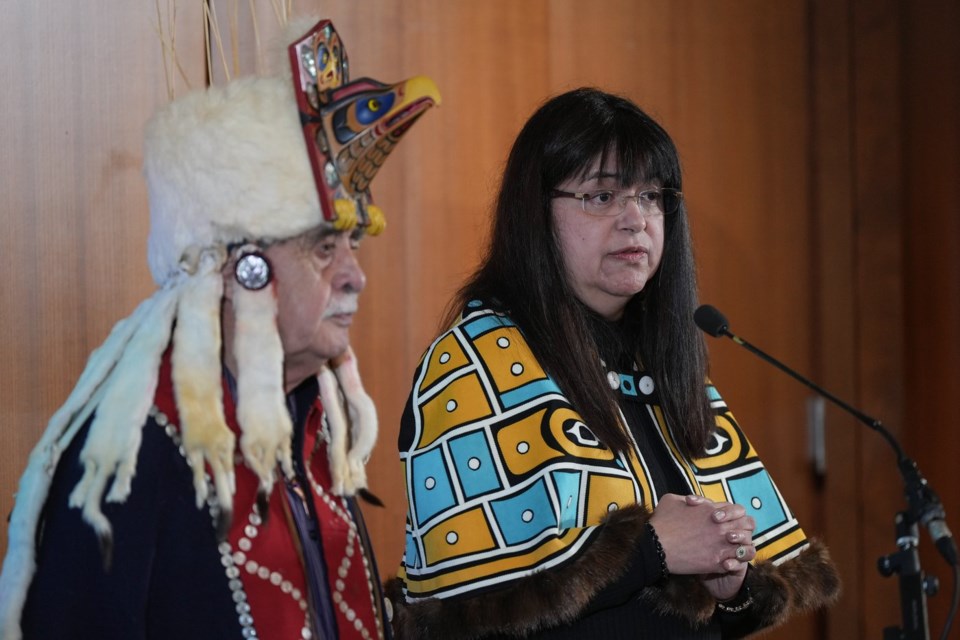VANCOUVER — Inaction by the RCMP has emboldened criminals to enter and stay on First Nation reserve lands without the fear of consequences, worsening a drug crisis and violence, the Heiltsuk Tribal Council says.
The small First Nation on British Columbia’s Central Coast said it is taking the attorney general of Canada to court, arguing its Charter rights have been violated because police refuse to enforce its bylaws, including those around trespassing that would allow officers to remove people engaged in dangerous activities.
Elected Chief Marilyn Slett told a news conference Tuesday that her community in Bella Bella, B.C., is experiencing a crisis due to drugs and drug trafficking and that harms from overdoses and sexual violence are made worse because of the Mounties refusal to enforce Heiltsuk law.
She said laws enacted by the Indigenous band council, like those related to trespassing and residency, are federal laws under the Indian Act.
"This refusal to enforce First Nations' bylaws is a Canada-wide issue that erodes the rule of law in First Nations communities, exasperates systemic problems involving substance abuse, (and) deprives First Nations governments of the necessary tools to protect our communities," she said.
She said there is nothing preventing Mounties from enforcing the bylaws.
"The only barrier appears to be the racism and discrimination that sees them ignoring Indigenous bylaws, while enforcing all other federal laws as well as property laws on behalf of non-Indigenous communities, landowners and businesses."
Neither the RCMP nor the federal Justice Department responded to a request for comment on the lawsuit.
In briefing notes prepared for Shawn Tupper, then-deputy minister of Public Safety Canada, before a 2024 standing committee hearing related to First Nations and Inuit policing, the federal government said under the Indian Act, First Nation governments have the right to adopt laws and bylaws.
The notes say “historic friction” with the RCMP creates pressure and many Indigenous communities see police as the primary barrier to effective enforcement, and add that "lack of enforcement and prosecution regarding First Nations laws has resulted in numerous complaints regarding police services."
"However, giving practical effect to this right requires collaboration between the federal government, provinces and territories, Indigenous governments and law enforcement entities to ensure that there is capacity to draft and adopt laws and clarity on prosecution," the notes say.
It says First Nations don't need their own police service to be able to make their own laws.
The action filed in B.C. Supreme Court argues that the Mounties' refusal to act amounts to unequal and discriminatory treatment that infringes on the First Nation's section 15 Charter rights to receive equal protection and benefit of the law without discrimination.
Slett said the Nation has met several times with the RCMP to discuss the issue and police have offered "excuses ranging from confusion to saying our bylaws, need to go through the RCMP legal services for review."
When the police claim they can't enforce the bylaws it creates an atmosphere in the community where those committing crimes have no fear and go "unchecked," she said.
"We have people in our community that reached out to the RCMP and they don't show up."
The nation's statement of claim says it has on "numerous occasions" denied or withdrawn permission for specific people to enter or stay in Bella Bella if leadership is satisfied their conduct is harmful to the community.
"(The tribal council) has repeatedly requested that the RCMP enforce trespass laws to remove individuals who either lack or have lost the right to enter or stay on reserve. These requests, however, have all been refused," the documents say.
The lawsuit, filed Monday, says the RCMP's refusal to enforce the bylaws mean witnesses to crimes aren't coming forward with evidence and victims are leaving the community because they don't feel safe.
Grand Chief Stewart Phillip of the Union of BC Indian Chiefs told the news conference the organization supports the work being done by the Heiltsuk Nation.
Phillip said even if communities know who the drug dealers are “it’s virtually impossible to shut them down” because the RCMP says there is nothing they can do.
"Public safety is a fundamental human right. Safety of property and home also is a fundamental human right," he said.
"And our First Nations communities are in extremely dire circumstances with the opioid crisis. We're losing so many of our precious young people to overdose deaths."
This report by The Canadian Press was first published Feb. 25, 2025.
Ashley Joannou, The Canadian Press
